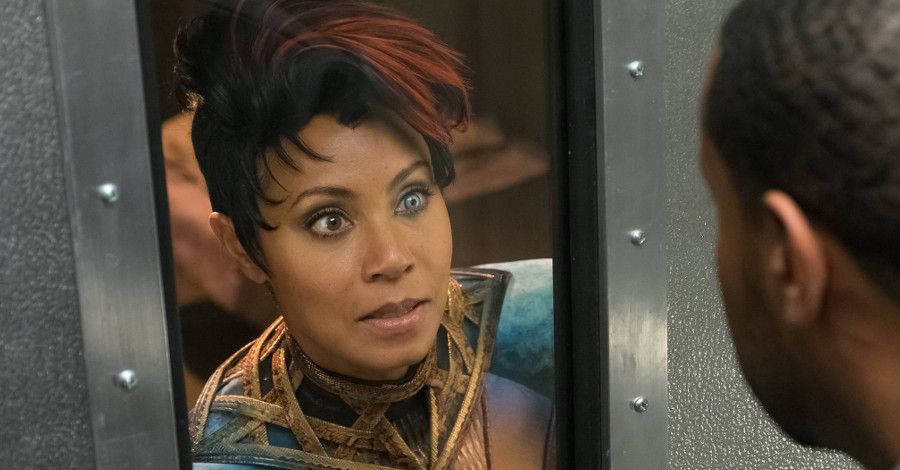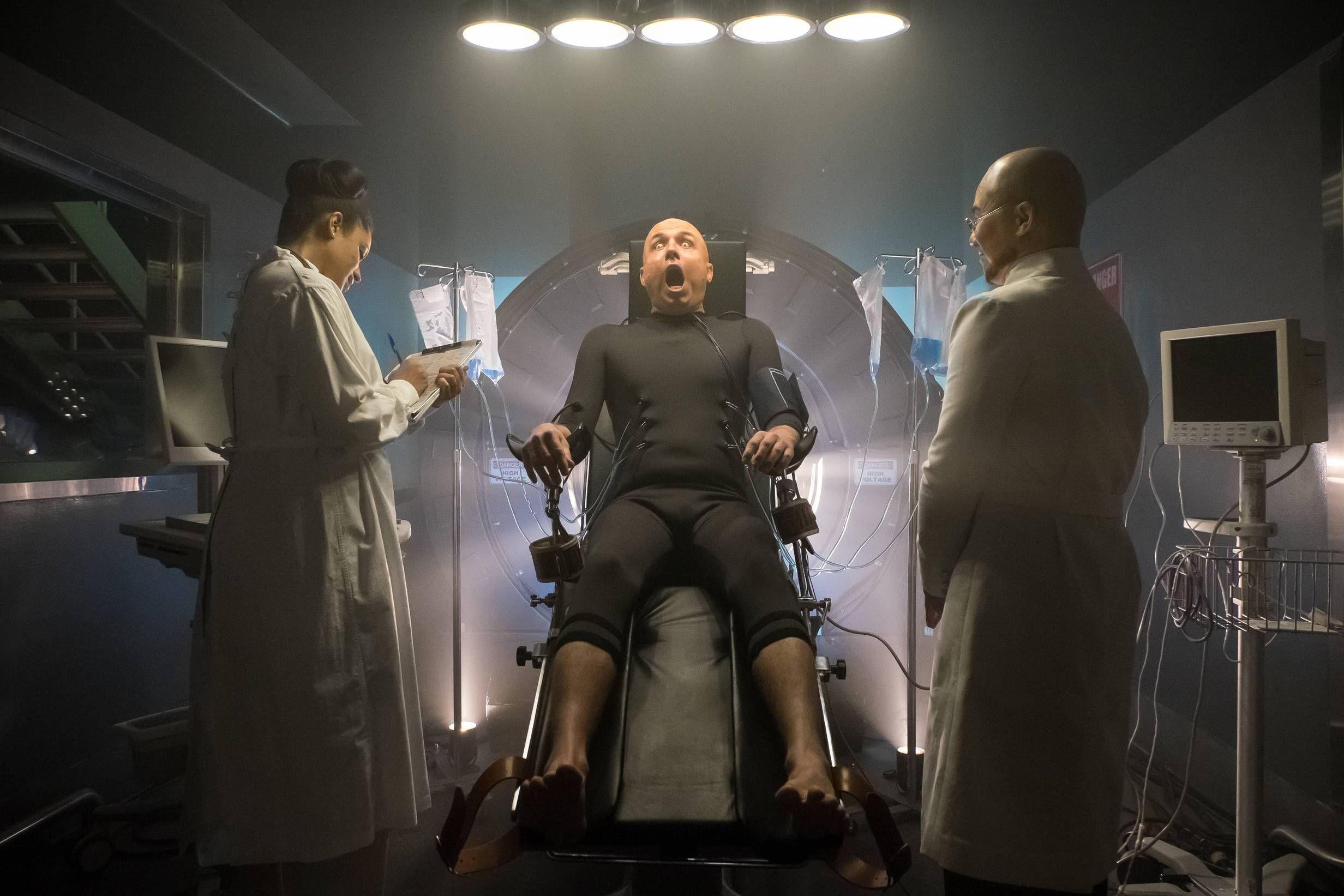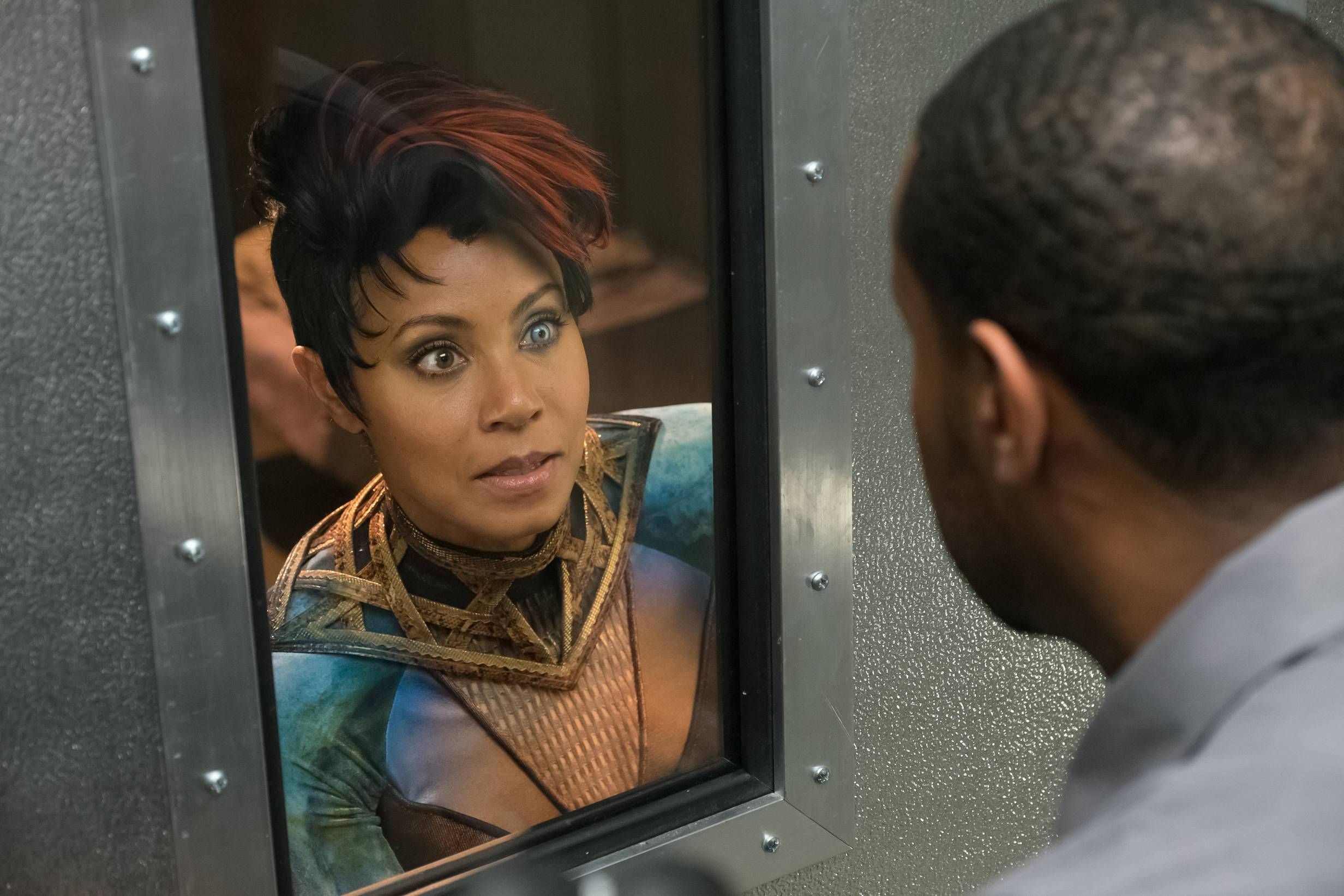An incoming final confrontation between good and evil. Storylines both big and small colliding in unexpected ways. Scads of throwaway fanboy Easter Eggs. And a character death or resurrection to sweeten the pot. At this point in its sophomore season, Fox's Dark Knight drama "Gotham" has entered some essentially familiar territory for a comic book-based TV show. But while the broad strokes of long form storytelling feel familiar, the actual payoffs of tonight's penultimate "A Legion of Horribles" episode remain sorely lacking.
While there are a thousand moving parts to "Gotham's" story at this point, this episode boils down to confrontations both new and old. Selina Kyle faces off with her old friend Firefly. Bruce Wayne finall meets his parents' killer. Jim Gordon similarly pushes to nail a criminal mastermind. Edward Nygma loses his battle with sanity. And Fish Mooney fights against Jada Pinket Smith's desire for a better career arc. And in scene after scene, each of these conflicts foregoes real character development for attempts at gnarly social media buzz moments.
Take Selina's fight in the basement of Arkham as an early example. Last week's episode ended with the Cat staring down the barrel of her fractured former friend's fiery weapon. That cliffhanger immediately becomes a fakeout when Selina dodges the massive column of flame...somehow. The logistical improbability of a person avoiding a psyhopath's flamethrower in closed quarters might seem like a nit to pick, but as Selina repeatedly dashes herself out of harm's way, there's never any turn in the drama to pique our interest instead. Rather, the story spins its wheels until a hopelessly outmatched hero fails to jog Firefly's memory and simply says "If you're a fire god, make me your servant...because reasons."
The core investigation fairs about as well in terms of logic and investment. Finally on the same page that Hugo Strange is the malevolent force that caused the death of the Waynes and messed up everything else in Gotham all year long, Bruce, Jim Gordon, Alfred and Lucius Fox launch a desperate plan to uncover where the sinister doctor's secret genetics lab is. Lucius provides both a flimsy cover (a last-minute Wayne Enterprises inspection) and scientific mumbo jumbo to make the lab a worth MacGuffin ("It must be some radiation or something, which I can track with a heretofore unmentioned mini geigercounter!"), but the whole Arkham break in is just a front for our main characters to lamely complete their supposed journeys.
In that sense, Bruce's arc holds together slightly better than Jim's. The boy billionaire has screwed up his own investigation into his parent's death at every turn, but in his obstinate refusal to give up despite a lack of skill, Bruce impresses Alfred enough that the old butler has cut the preteen vigilante loose to go his own way. There's talk of Bruce acting like his father to spur this moment on, and that idea revolves back around when Bruce is finally alone with Strange, who similarly connects the boy's rigid sense of right and wrong with old Papa Wayne. This falls apart as we never see Bruce's supposed drive manifest itself in any other way than repeated grasping at straws. There's no emotional of philosophical drive to the character and so he's there simply because he's supposed to be. That problem is compounded for Gordon, who's arc is supposedly about him finding himself again after falling from grace as a policeman. But other than occasionally repeating "I'm not a cop anymore" to whomever will listen, Jim's motivations are scattershot and his emotional state vague. When Strange reveals that he's been onto the conspiracy the whole time, the twist is merciful in that it means we might see some action happen, but the whole affair feels like pieces being moved on a game board more so than real drama.
And for all his machinations and actor BD Wong's admirable scenery-chewing, Strange's own story makes less sense now that his full backstory has been revealed. For weeks, the villain's motivation for reviving dead criminals has gone completely undeveloped, though when the show inserts a last-minute set of "masters" that have apparently been pushing him to undertake this work the whole time (more on them in a moment), we still never get a sense of why old Hugo has taken to the project with such fervor. As he cranks up his lazarus juice to bring back one sociopathic stiff after another, the season's driving big bad has little more motivation than "mad sciencing sure is fun." There's no idea given as to why he'd go so far off the reservation nor why he's brainwashed criminal after criminal with "You're a god now" fairy tales when they have no minds of their own.
The headline element of this whole story though is surely meant to be the multitude of villains unleashed by Strange's experiments. Yes, the entire season was subtitled "Rise of the Villains" for this very reason, and after last week's tease of Killer Croc, we're treated to a bevy of comic book faces this time out. There's '90s cannibal serial killer Cornelius Stirk who shows up just long enough to threaten Ed Nygma's life before he makes an 11th hour pact with Strange. And of course, the mystery masters of the whole Arkham enterprise are representative of Scott Snyder/Greg Capullo uber-baddies The Court of Owls -here represented by a loan woman whose choice to disguise her voice even when talking with her own associates is lazy showmanship at best. Last but not least is Clayface -plastic in both visage and characterization until the last minute when the Golden Age Basil Karlo take on the character is given Gordon's face. In that final moment, there's the hint of an actual payoff for Jim's long-suffering storyline. In order to redeem himself, the disgraced cop fighting his literal mirror image could be fun, and usually flat Ben McKenzie seems to be having fun with the prospect of playing two parts, but it's all too little too late.
Speaking of which, first season mainstay Fish Mooney is brought back in a fashion so underwhelming it's hard to understand what the purpose is except to tell this show's few diehard supporters "See what we did here?" For some reason, the undead mob boss retains her memories after being electroshocked into a DNA swap with "favorite animal of America's weirdest 3rd grader" the Cuttlefish. That transformation not only gives Fish a costume that looks like a leftover SeaWorld employees suit but somehow allows her to hypnotize those she touches -a detail obviously setting up some kind of late in the game "twist" in next week's finale.
But even as the plot surrounding all these characters cranks up its intensity in the final moments (Jim has a double! Lucius and Bruce are trapped in Ed's death trap! Selina must burn her way free! Alfred and Harvey are en route with reinforcements!), the most basic questions still linger. What's at stake for these characters? What are they really working towards? Why do we care if they win or lose? These ideas are the underpinnings of basic drama, and the show ignores them at virtually every turn to instead deliver weird, shocking or (worst of all) "bad ass" moments to the audience.
Say what you will about the consistency of other network superhero shows like "Arrow," "Agents of S.H.I.E.L.D." or "Supergirl," those series always have these questions locked in place before episode 1 airs. Characters are motivated by relatable ideas. Their struggles reflect clear themes and metaphors. And the audience always knows why they're supposed to care about the final battle. In comparison, all sorts of crazy shit could happen next week on "Gotham," but if it doesn't express any bigger idea, what's the point?



